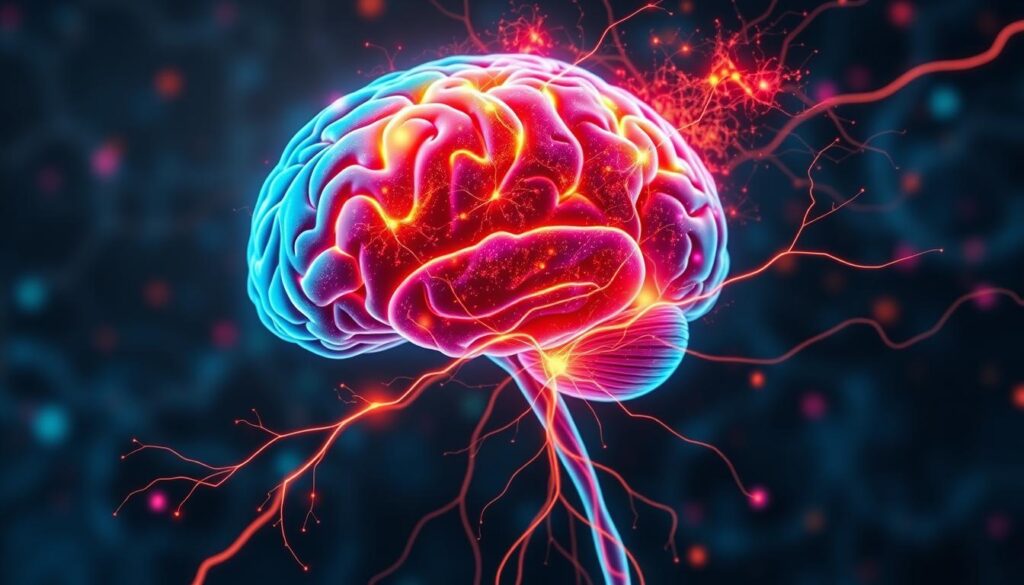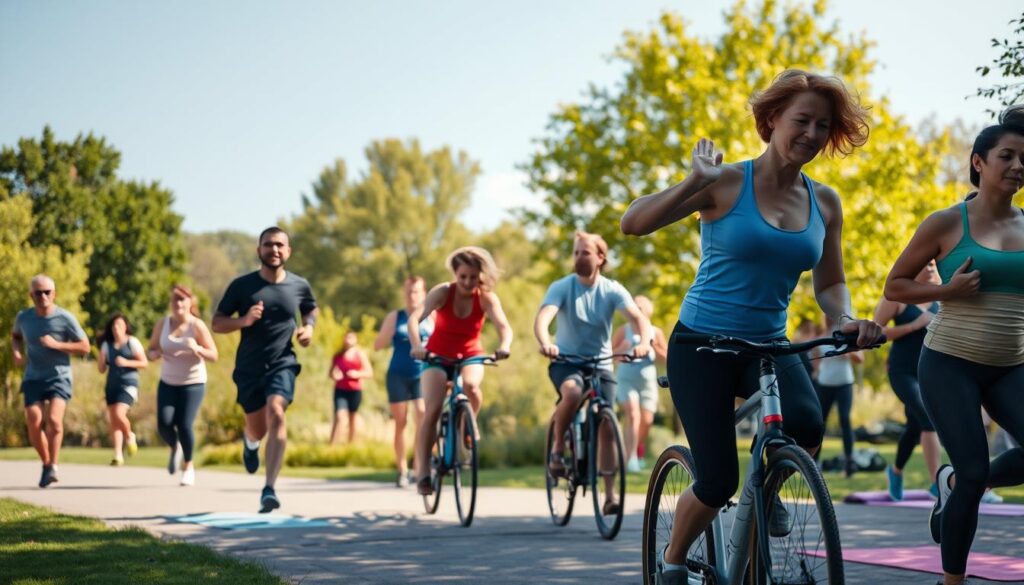For years, people have debated whether exercise or antidepressants are better for mental health. A new study has brought fresh insights to this debate. It might change what you think about the best way to fight depression.
Key Takeaways
- Exercise is 1.5 times more effective than medication or therapy for reducing symptoms of depression, anxiety, and psychological distress.
- Various forms of exercise, including walking, strength training, and yoga, all produce substantial mental health benefits.
- Exercise offers additional advantages over medication, such as reduced costs, fewer side effects, and physical health improvements.
- The study reviewed 218 unique studies with 14,170 participants, providing robust evidence on the comparative effectiveness of exercise and antidepressants.
- Despite the strong scientific support, exercise is still underutilized as a treatment option, with medication and psychotherapy being more commonly prescribed.
Table of Contents
Introduction to Exercise and Antidepressants
Major depressive disorder is often treated with antidepressants, but many people don’t get better or have side effects. This has led clinicians and patients to look for other ways to help, like exercise. Studies show that exercise can be as good as antidepressants for treating depression.
Overview of Depression and Common Treatments
Depression is the top cause of disability worldwide, affecting millions. While antidepressants are a common choice, not everyone gets better. In fact, many don’t improve even after trying a second type of antidepressant. This shows we need new and effective ways to treat depression and anxiety.
Importance of Finding Effective Treatments
It’s vital to find good treatments for mental health issues because so many people struggle. The World Health Organization says almost a billion people worldwide have a mental disorder. These disorders also cost the global economy a huge $2.5 trillion a year, and that could jump to $6 trillion by 2030. We need new, proven treatments to tackle this growing health issue.
| Key Statistics | Details |
|---|---|
| Depression is the leading cause of disability worldwide | [1] |
| Fewer than half of people respond to selective serotonin reuptake inhibitors | [3] |
| Around one-third of individuals remit from their first pharmacological treatment | [3] |
| Even fewer remit after switching to a second treatment | [4] |
| One in every eight people worldwide (approximately 970 million people) live with a mental disorder | World Health Organization |
| Poor mental health costs the global economy around $2.5 trillion annually, projected to rise to $6 trillion by 2030 | – |
| In Australia, an estimated one in five people (aged 16-85) have experienced a mental disorder in the past 12 months | – |
Next, we’ll look at how exercise can help with depression and how it stacks up against antidepressants.
Exercise as a Treatment for Depression
Research shows that exercise helps with both mild and severe depression. It makes the brain more flexible and grows new brain cells. This can help with the thinking problems that come with depression. Exercise also boosts brain chemicals that help fight depression.
Benefits of Exercise on Mental Health
Studies show that exercise is good for mental health. The U.S. Department of Health says adults should do at least 150 minutes of moderate exercise or 75 minutes of hard exercise each week. This kind of activity can make depression and anxiety better. It also makes you feel happy by releasing endorphins and takes your mind off problems.
Types of Exercise and Their Effects
Many types of exercise can help with mental health. Aerobic exercises like walking, jogging, and cycling help a bit with depression. Strength training and yoga are also good for fighting depression. Tai chi and qigong can improve mental health too. How intense and regular the exercise is matters a lot for how well it works.
| Exercise Type | Effect on Depression |
|---|---|
| Walking or Jogging | Moderate Reductions (Hedges’ g -0.62) |
| Yoga | Reductions (Hedges’ g -0.55) |
| Strength Training | Reductions (Hedges’ g -0.49) |
| Mixed Aerobic Exercises | Reductions (Hedges’ g -0.43) |
| Tai Chi or Qigong | Reductions (Hedges’ g -0.42) |
“Exercise and physical activity are great ways to ease symptoms of depression or anxiety but do not replace the need for talk therapy or medicines.”
Exercise is a strong tool for mental health, but it shouldn’t replace therapy or medicine. Using exercise with other proven treatments works best for improving mental health.
exercise versus antidepressants
The debate on whether exercise or antidepressants is better for treating depression has been ongoing. Recent reviews and meta-analyses have looked into this, with varied results. Some studies suggest antidepressants are best, while others say exercise can be as effective or even better than medication.
Research shows that exercise and antidepressants can be equally effective for some people. Others see better results when combining exercise with medication. This shows that treating depression can vary a lot from person to person.
Depression is the leading cause of disability worldwide, says the World Health Organization (WHO). The COVID-19 pandemic made it worse, with a 26%–28% increase in mental health issues in 2020. So, knowing how exercise and antidepressants compare is crucial.
| Treatment Modality | Effectiveness | Potential Benefits |
|---|---|---|
| Exercise | Equally effective or more effective than antidepressants | Improved neuroplasticity, hippocampal function, serotonin levels, and brain-derived neurotrophic factor (BDNF) expression |
| Antidepressants | Commonly prescribed, but many patients do not respond or experience side effects | Pharmacological intervention to address chemical imbalances in the brain |
Both exercise and antidepressants play a key role in treating depression. A personalized approach that combines both might work best. Always talk to a healthcare professional to find the right treatment for you.
“Physical activity should be viewed as a first-choice treatment for individuals living with mental health issues.”
In conclusion, deciding between exercise and antidepressants for depression is complex. Each has its own benefits and downsides. By understanding the latest research, we can make better choices for treating depression and improving mental health.
Effectiveness of Exercise Compared to Antidepressants
The debate on whether exercise or antidepressants is better for depression has been ongoing. Many randomized controlled trials have looked into this, and their results are quite telling.
Research Findings from Randomized Controlled Trials
A detailed review showed that exercise and antidepressants both helped about 50% of people feel better. But there were some differences:
- About 44% of people in both the antidepressant and exercise groups felt better after 16 weeks.
- Those taking antidepressants had more severe depression than the running group, showing exercise might help with milder depression.
- Running improved weight, waist size, blood pressure, and heart health. But antidepressants didn’t help as much in these areas.
But not all studies agree. Some focus only on drugs for depression, leaving exercise out. This leaves a gap in understanding how exercise helps with severe depression.
Sticking with exercise over time is key. Regular physical activity is seen as crucial for fighting depression.

“One in every eight people worldwide (970 million people) live with a mental disorder, and poor mental health costs the world economy approximately $2.5 trillion each year, projected to rise to $6 trillion by 2030.”
The need for effective mental health treatments is growing. Studies show exercise and antidepressants both help with depression. Each has its own benefits and things to consider.
Exercise and Antidepressants Combined
New studies show that mixing exercise with antidepressants can help more with depression. When exercise is added to treatment, it makes brain-derived neurotrophic factor (BDNF) levels go up faster. This means exercise and medication might work together to help the brain heal and grow, which is important for fighting depression.
Synergistic Effects of Combination Therapy
About 44% of people in both groups felt better after 16 weeks. The running group got better in many areas like weight, waist size, blood pressure, and heart health. The medication group didn’t do as well in these areas. This shows that exercise and antidepressants can work together to improve both mind and body health.
| Measure | Antidepressants | Exercise |
|---|---|---|
| Improvement in Depression/Anxiety Symptoms | 44% | 44% |
| Weight | Slight Deterioration | Improvement |
| Waist Size | Slight Deterioration | Improvement |
| Blood Pressure | Slight Deterioration | Improvement |
| Heart Health | Slight Deterioration | Improvement |
This study wasn’t a true trial, and people could choose their treatments. Still, the results hint that exercise and antidepressants together could be a better way to fight depression. They could help with both mental and physical health.
“The recent research comparing exercise and medication was not a randomized trial, and participants were allowed to choose their treatment options, making it challenging to determine if effects were solely due to the treatment itself.”
More research is needed to understand how exercise and antidepressants work together. If they do have a strong effect, it could greatly improve treatment for depression.
Neurobiological Mechanisms of Exercise for Depression
Studies show that exercise can help reduce depression symptoms by affecting the brain in many ways. It helps make the hippocampus, a key mood-regulating area, work better. Research indicates that people with depression often have a smaller hippocampus and fewer neurons. Exercise can help fix this.
Role of Hippocampus Plasticity and Neurogenesis
Exercise boosts the growth of new neurons in the hippocampus, a process called neurogenesis. This can help improve mood and brain function. It’s a key reason why exercise can fight depression.
Involvement of Brain-Derived Neurotrophic Factor (BDNF)
BDNF is a protein that helps neurons grow and survive. Exercise increases BDNF levels, which can help reduce depression symptoms. This is because it supports healthy neurons and brain function.
Research also points to other ways exercise helps, like improving communication between the brain, muscles, and gut. These connections are important for fighting depression. Studying them can lead to better treatments.

“Exercise can increase the production of neurotransmitters that regulate mood, reducing the release of stress hormone cortisol and inducing neurogenesis.”
Scientists are still learning how much and what type of exercise works best for depression. They aim to find the most effective ways to help people with this condition.
Factors Influencing Treatment Choice
The choice between exercise and antidepressants for depression depends on how severe the depression is. For mild to moderate depression, both exercise and antidepressants can help equally well. But for severe depression, exercise might not be enough. Then, a mix of treatments, including medication and close doctor watch, might be needed.
A study in China showed that exercise tailored to each person helped college students with depression during the COVID-19 pandemic. This shows how important it is to have treatments that fit each person’s needs.
Severity of Depression and Treatment Considerations
The severity of depression is key in picking the right treatment. For mild to moderate depression, exercise can be as good as antidepressants in easing symptoms. But for severe depression, a mix of exercise, medication, and close doctor care might be best.
| Severity of Depression | Recommended Treatment Approach |
|---|---|
| Mild to Moderate Depression | Exercise or Antidepressants |
| Severe Depression | Combination of Exercise and Antidepressants with Medical Supervision |
It’s important to have treatment plans that fit the person’s needs and likes. Knowing how severe the depression is helps doctors and patients work together to find the best way to help with mental health.
“Personalized treatment plans considering the patient’s specific needs and preferences are important for optimal outcomes in managing depression.”
Personalized Treatment Approaches
Experts say personalized treatment approaches are key for people with depression. Exercise and antidepressants help manage depression, but the best choice depends on the patient. Factors like what the patient prefers, how motivated they are, and how severe their depression is matter.
Healthcare providers should team up with patients to create tailored treatment plans. These plans should look at the patient’s unique needs and what they prefer. They should also weigh the good and bad of different treatments.
Importance of Tailored Treatment Plans
A big study looked at 41 studies with 2,264 people. It showed that exercise really helps with depression and its symptoms. Exercise was found to be very effective, needing only 2 people to treat one.
But, the study also pointed out that some things matter. Like if someone has major depression or if they get help with their exercise. These things can change how well exercise works.
Another study looked at genes and depression. It found that certain genes made men more likely to feel better with exercise. This means looking at a person’s genes could help find the best treatment for them.
“Healthcare providers should work closely with patients to develop tailored treatment plans that consider the individual’s needs and preferences, as well as the potential benefits and drawbacks of different interventions.”
Exercise Adherence and Consistency
For exercise to help with depression, sticking to it is crucial. Some people start to feel better in a few weeks, while others might take months. Staying with an exercise plan over time helps the most with mental health.
Doctors should help patients find ways to keep up with exercise. This is key because many people stop exercising early on. It’s important to keep in mind that more people choose to exercise over taking antidepressants and then stop.
A study looked at 141 patients with depression and/or anxiety. It found that 82% of those on antidepressants stuck with their plan, but only 52% of those who ran did. But, running helped with weight, waist size, blood pressure, and heart health. The antidepressant group saw some health markers get worse.
Adding exercise to mental health care needs support and encouragement. Changing habits is harder than taking pills, which is why fewer people stuck with exercise. Doctors should help patients find ways to keep exercising long-term. This is key to getting the most out of exercise for depression.
| Metric | Antidepressant Group | Exercise Group |
|---|---|---|
| Adherence to Prescribed Protocol | 82% | 52% |
| Improvement in Depression/Anxiety Symptoms | 44% | 44% |
| Weight Change | Slight Deterioration | Improvement |
| Waist Circumference | Slight Deterioration | Improvement |
| Blood Pressure | Slight Deterioration | Improvement |
| Heart Function | Slight Deterioration | Improvement |
Limitations and Future Research Directions
Many studies have looked into how exercise and antidepressants help treat depression. But, researchers still face challenges. It’s hard to know if people are doing the right amount of exercise or taking the right dose of medication.
Also, we don’t know which exercises work best for people with depression. Future research is needed to solve these problems. It will help us understand which is better for treating depression.
Challenges in Comparing Exercise and Medication Dosages
It’s tough to figure out how much exercise or medication is needed. Exercise has many factors like how often, how hard, how long, and what type of activity. But, antidepressants are easier to measure and control.
Future studies must tackle these challenges. They need to find new ways to compare exercise and medication for depression.
“Exercise should be considered a core treatment for depression alongside medication and psychotherapy.”
As research on depression grows, future studies will use new methods to understand exercise and medication better. By solving past research problems, we can find the best treatments for depression.
Conclusion
The study on exercise and antidepressants for treating depression shows mixed results. Some studies say they work equally well. Others believe exercise might be better, especially with medication. The best choice depends on the person’s needs and the severity of their depression.
Combining lifestyle changes with medication might be the best way to help people with depression. Depression affects over 100 million people worldwide. It’s important to find the best treatments, using both exercise and antidepressants to help those in need.
As mental health research grows, we should look into which exercises help most with depression. We also need to tackle issues like disability and health problems. By understanding how exercise helps, doctors can make better treatment plans. This will help people recover more effectively.
FAQ
What are the benefits of exercise for mental health conditions like anxiety and depression?
A big study found exercise helps more than standard therapy or meds for anxiety and depression. It shows all kinds of exercise, like walking, lifting weights, and yoga, boost mental health. Short, intense workouts work best.
How effective is exercise compared to antidepressant medication in treating depression?
Studies say exercise can beat meds or therapy by 1.5 times in fighting mild to moderate depression and stress. Many reviews show exercise can be as good, or even better, than antidepressants for depression and anxiety.
What are some of the potential neurobiological mechanisms by which exercise can alleviate depression?
Exercise might help by making brain cells stronger and growing new ones. It also boosts a key brain factor called BDNF. This could help fix brain problems in depression.
What factors should be considered when choosing between exercise and antidepressants for the treatment of depression?
Choosing between exercise and meds for depression depends on how bad the depression is. For mild to moderate depression, both can work well. But for severe depression, you might need both and close doctor care.
Why is personalized treatment approach important for individuals with depression?
Personalized treatment is key for depression. What works best varies by person, like their likes, motivation, and how bad their depression is. Doctors and patients should work together to find the right mix of treatments that fit the patient’s life and needs.
What are some of the limitations in research comparing the effectiveness of exercise and antidepressants for depression?
Research has some limits. It’s hard to know if people are doing enough exercise or taking the right amount of meds. Also, not all exercises may help depression the same way.

Hello, I am Olivia Stone, and I’m here to help you find balance in the chaos. As a wellness coach, I’ve spent years teaching busy professionals how to integrate mindfulness, stress management, and holistic health into their daily routines. Wellness doesn’t have to be complicated—it’s about small, intentional actions that bring peace and positivity into your life. Let’s work together to create a lifestyle that not only supports your goals but inspires you to feel great inside and out.

